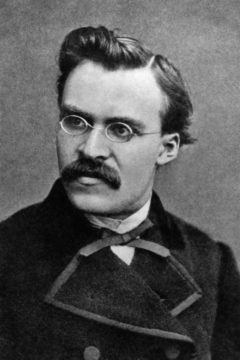by Martin Butler
 Ideas often become popular long after their philosophical heyday. This seems to be the case for a cluster of ideas centring on the notion of ‘lived experience’, something I first came across when studying existentialism and phenomenology many years ago. The popular versions of these ideas are seen in expressions such as ‘my truth’ and ‘your truth’, and the tendency to give priority to feelings over dispassionate factual information or even rationality. The BBC is running a radio series entitled ‘I feel therefore I am’ which gives a sense of the influence this movement is having on our culture, and an NHS trust has apparently advertised for a ‘director of lived experience’.
Ideas often become popular long after their philosophical heyday. This seems to be the case for a cluster of ideas centring on the notion of ‘lived experience’, something I first came across when studying existentialism and phenomenology many years ago. The popular versions of these ideas are seen in expressions such as ‘my truth’ and ‘your truth’, and the tendency to give priority to feelings over dispassionate factual information or even rationality. The BBC is running a radio series entitled ‘I feel therefore I am’ which gives a sense of the influence this movement is having on our culture, and an NHS trust has apparently advertised for a ‘director of lived experience’.
But what exactly is ‘lived experience’ and how does it differ from simple ‘experience’? The idea of experience is of course central to the empiricist philosophical tradition. All our ideas and knowledge, Locke argues, come from experience. But the empiricist notion of experience is a rather anaemic, disembodied and depersonalised affair, something we just passively receive through the senses. The notion of lived experience, on the other hand, recognises that we are embodied beings who actively engage with the world and those around us as we go about our lives. It takes into account our feelings, fears and anxieties, the dilemmas we face, and the opportunities and constraints we encounter. Crucially it recognises personal differences, differences which may be conditioned by who we are and how others treat us. My lived experience of parenthood and family life, for example, is no doubt very different from many others. Similarly, the lived experience of a youth from a deprived background when dealing with the police or government officials will probably be very different from that of a well-heeled business person.
Clearly, an individual’s account of their lived experience provides something that data and bald empirical facts cannot provide. When discussing data collection with my students I used to give them an exercise where they compared the knowledge gained from a first-hand description given by a victim of domestic violence with a table from a research study showing the number of incidents and types of domestic violence recorded over a given period of time. The conclusion was that we undoubtedly learn something from the first-hand account that not even the most comprehensive set of statistics can possibly reveal.
The idea of lived experience is also important politically. In the spirit of democracy, politicians ought surely to have at least some idea of what life is like for the majority of people living in their society. However, one common complaint about contemporary politicians is that their lived experiences are usually very different from most of those they attempt to represent. This matters both in terms of how they are perceived by the public at large, and the lack of understanding they are likely to have of the problems faced by large sections of society. But there is a deeper problem. There are many competing perspectives on what happens within a society. Different religious or ethnic groups, different genders and generations, those with varying levels of education and wealth and so on, may experience life in a community in completely different ways, and very often these perspectives will be hard to square with one another. This in turn admits the postmodern idea that ‘my truth’ might be quite different to ‘your truth’.

The idea of ‘truth’ as something subjective may seem odd, but nevertheless it is clear how the notion of lived experience leads in this direction. Philosophically it has much in common with the Nietzschean concept of perspectivism – i.e., the view that there is no one correct or common perspective on the world, rather a myriad of different and competing points of view. Which narrative dominates and becomes the established perspective of the society will simply be down to who has the most power and influence. We might argue that ideally everyone’s voice should be heard and taken account of, and that no one group or perspective should dominate. But there are problems with this that show up some important limitations in the very idea of lived experience.
Firstly, it’s important to note that the significance an individual attaches to their experience is not written into the experience itself but is something that the experiencers themselves must actively impose upon it. Wittgenstein says somewhere, “…experience doesn’t direct us to derive anything from experience.” It is possible to understand your own lived experience as either telling important truths or as partial and distorted, in others words, to recognise that ‘your truth’ might not be the whole truth, and that there is an imperative need to look beyond one’s own lived experience. Supposing a man’s lived experience of women is that he is always rejected, or a woman’s lived experience of men is that she is always controlled and abused – surely the correct response is not to celebrate ‘my truth’ but to reflect on why these experiences are as they are, and to look at relevant facts outside of the lived experience. Pure lived experience should not constitute the last word, and giving lived experience a kind of sacred status may well result in prejudiced and bigoted attitudes. We normally want to explain our experiences, and these explanations will involve concepts not found in the experiences themselves. For example, negative experiences can be explained as bad luck, malicious intent by others, poor decisions by the individual concerned, or the result of structures within society. In this respect then, the lived experience itself can only take us so far.
Secondly, in a society of competing voices all keen to advertise ‘their truths’, the danger is that we can end up with a hierarchy of truths, a Tower of Babel of voices, all determined to be heard but each more concerned with their own ‘truths’ than anyone else’s. Indeed, it is sometimes suggested that understanding others is impossible without being directly acquainted with their lived experience. But this can lead to the idea that one group in society will never understand another group, and one individual will never understand another individual, unless they share that experience. Which in turn can lead to the idea of staying in one’s lane, concentrating on our own bubble of lived experience, to the point where we are unlikely to identify with or care about those outside that bubble. Take the claim, often made, that an author, for example, can only write about being an oppressed minority if they have the lived experience of being an oppressed minority. Of course, it might well be the case that an author cannot write convincingly about lives they have no direct experience of, but the proof is in the product, not in whether or not they have had the correct lived experience, and it is of course also possible that someone with the right lived experience cannot write convincingly about it anyway. Here we run up against the fact that the very notion of experience can be philosophically confusing. If we take experience as something intrinsically ineffable, as some do, then ultimately we can never know anything about another’s experience. This, of course, is not the case. We can talk about other people’s experiences, biographers do it all the time. We can imagine experiences quite different from our own and write convincingly about them. Did James Joyce need to be a woman to bring to life the immortal Molly Bloom?
As with identity politics, the lived experience movement occupies a rather awkward philosophical position. On the one hand it is billed as a progressive movement giving voice to minority groups who would otherwise lack power and influence, but at the same time it is essentially individualistic and focuses on difference. These two aspects can work against each other, since too much focus on difference and diversity will undermine the common culture which is required for societies to care about those minority groups. Difference and diversity by themselves just lead to fragmentation and fracture, and empty calls to ‘celebrate diversity’ are by no means enough, resting as they do on a pre-conceived assumption that we all already share a non-diverse value, i.e. that we all celebrate diversity. In fact no society can be built on radical diversity where there is a unbridgeable gap between competing voices. The idea that society is a cacophony of competing voices and that the job of the politician is to find a compromise that will satisfy all is incoherent. What exactly will tie these voices together? What will form the basis for the common ground that is surely required? The only kind of diversity that can be valued within a society is one which is set against a background of shared values. We need to look beyond the particularities of identity and lived experience to a more substantive ethic which will re-enforce a common culture, a common humanity, and indeed common experiences and aspirations. Only then will those with different lived experiences or different identities meld into a caring society in which all matter.
